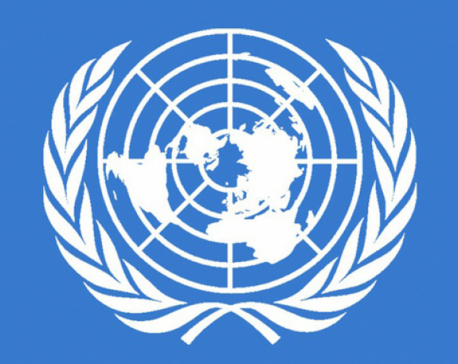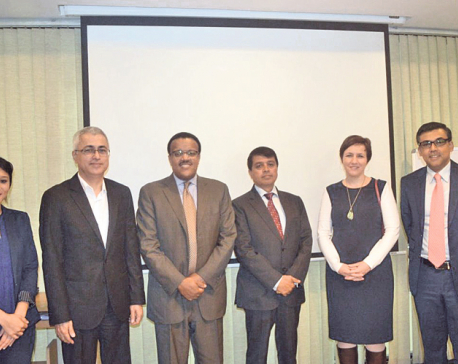
OR
Public-private cooperation stressed to meet SDGs
Published On: November 21, 2017 03:03 PM NPT
KATHMANDU, Nov 21: Public-private sectors should work in a coordinated way to meet the sustainable development goals (SDGs), stressed representatives from organizations concerned.
The SDGs also known global goals aim to eliminate all sorts of poverty from the entire world by 2030 AD and attain economic progress. The SDGs, a set of 17 goals, is the United Nations universal call to act against 169 targets to end all sorts of poverty, achieve gender equality and social justice and so on.
At a program on "role of private sector for sustainable development" organized by the United Nations Development Program (UNDP) and the Nepal-based Embassy of Republic of Korea (RoK) here today, public-private cooperation was stressed to achieve the goals of sustainable development.
Program participants were univocal that private sector's role was vital in poverty eradication and the creation of investment-friendly atmosphere was a must to encourage the private sphere to contribute to efforts aim to alleviate poverty.
Though Nepal has abundant potentialities for investment in agriculture, tourism, and energy, such potentialities have not been tried much, they said, insisting on the need to take measures to bring additional foreign investment to home.
National Planning Commission vice-chair Dr. Swarnim Wagle who was present on the occasion said the government had formulated its policies, plans, and programs in tune with the SDGs. "Nepal has witnessed significant improvements in the areas of health and education in the recent years and the government is doing a role of facilitator to promote domestic and foreign investment in big projects."
Secretary at the Ministry of Industry, Yam Kumari Khatiwada, shared that the government had accorded its priority to the creation of atmosphere friendly to youths so that they could utilize their skills and knowledge at home.
Global Compact Nepal vice-chair Pradeep Vaidya highlighted the importance of public-private coordination to see progress against targets covered by the SDGs.
RoK's Ambassador for Nepal Park Young-Sik was of the view that proper utilization of agro, tourism and hydropower sectors would help Nepal achieve the SDGs.
UNDP Resident Representative in Nepal Valerie Julliand suggested that Nepal should lay its focus on economic progress to achieve the goals of sustainable development. RSS
You May Like This

Home Minister Thapa stresses cooperation to tackle climate change
KATHMANDU, June 10: Home Minister Ram Bahadur Thapa today stressed the need for cooperation and solidarity among the South Asian... Read More...

Collaboration among dev partners and UN stressed for Nepal's socio-economic progress
KATHMANDU, April 21: The United Nations has stressed on collaboration among the United Nations, its specialized agencies and development partners... Read More...

IFC, Global IME Bank discuss mutual cooperation
KATHMANDU, Nov 11: The International Finance Corporation (IFC) has held a meeting with Global IME Bank Ltd (GIBL) to discuss about... Read More...







Just In
- NRB to provide collateral-free loans to foreign employment seekers
- NEB to publish Grade 12 results next week
- Body handover begins; Relatives remain dissatisfied with insurance, compensation amount
- NC defers its plan to join Koshi govt
- NRB to review microfinance loan interest rate
- 134 dead in floods and landslides since onset of monsoon this year
- Mahakali Irrigation Project sees only 22 percent physical progress in 18 years
- Singapore now holds world's most powerful passport; Nepal stays at 98th











Leave A Comment